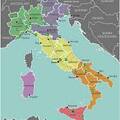Good morning/afternoon/evening, Ladies and Gentlemen! Let me introduce myself: my name is Zoran Krizsics, I'm a fourth-year law student at the University of Pécs.
In today's presentation I would like to look at the shared legal history of two nations that mutually influenced each other. I strongly believe that their long personal union, which lasted 816 years, shows a rare example of cordial cooperation between nations.
In the next 15-20 minutes I will focus on selections that I regard as major milestones in their shared legal history.
Let's start at the very beginning, in 1089, the year that King Zvonimir (1075-1089) died. After his death, Croatian nobleman could not agree on a suitable successor, consequently unrests followed. During this succession crisis, the "heads" of Dalmatian cities, who assembled in Split to discuss the situation, decided to send a delegation to the king of Hungary, Ladislaus and ask for his assistance: in exchange for his intervention to end the civil war that ravaged the country, he was offered the Croatian throne. Ladislaus accepted the mission and started his campaign in Croatia. While his powerful army was advancing in Croatia, he was informed that the Cumans and the Pechenegs attacked Hungary in his absence. The king, as might be expected, decided to retreat from his campaign against Croatian tribes and immediately returned to Hungary to crush the marauding army..
The occupied Croatian territories were not annexed to Hungary, King Ladislaus decided to appoint his nephew, Prince Álmos to govern the area. During his reign the country fell into chaos, in the midst of these turbulent times the Croatians elected a nobleman, Petar to the throne. Petar II was not able to establish his rule as he did not receive total recognition as sovereign. Prince Álmos resigned the throne to King Coloman in 1095. After the Hungarian king defeated Petar's troops in April 1097, he was crowned king of Hungary and Croatia in 1102. From 1102 to 1918 the two countries formed a personal union: Croatian royal dynasties no longer reigned in Croatia, the crown was held by Hungarian kings and the independent, sovereign Croatian state ceased to exist.
The following part of my presentation will deal with some features of the reign of Louis the Great, since both Hungary and Croatia owe a lot to this exceptional sovereign. King Charles's son, Louis the Great, who was crowned in 1342, fought numerous battles and wars to strengthen and centralize his power. We must highlight the significance of his war against Venice (1356-1358), which ended with the Treaty of Zara. Under this treaty Venice had to give all its possessions in Dalmatia to the king and had to cancel his title "Prince of Dalmatia and Croatia". We can consider the Treaty of Zara as one of the highlights of Croatian history, because for the first time after King Zvonimir's death, Dalmatian cities and islands returned to the Kingdom of Croatia. At the same time Venice was forced out of the Croatian coast. King Louis the Great died in 1384 after 40-year reign.
The next minutes of my presentation will be built around the Croatian Pragmatica Sanctio (Pragmatic Sanction). Our starting point is 1711 when Charles III of Hungary was crowned. During his reign Hungary attempted to strengthen ties with the politically, economically and territorially weakened Croatia-Slavonia.
Therefore the Hungarian Diet (Hungarian Estates) passed a decision concerning the Croatian Sabor: they though that the king should give his royal assent only to those decisions of the Croatian sabor which did not oppose Hungarian laws.
In the end, this statute never got approved by the sovereign because the National Assembly was dissolved due to the plague. However, the intentions of the Hungarian Diet put Croatian noblemen on guard, who during the following years made every effort to emancipate Croatia-Slavonia from Hungary.


